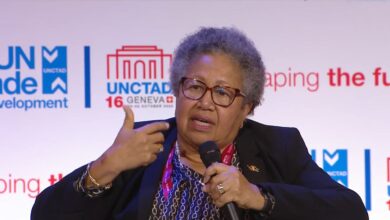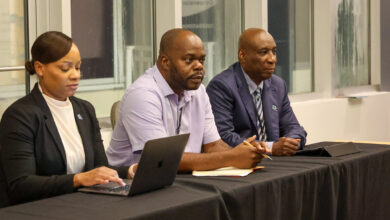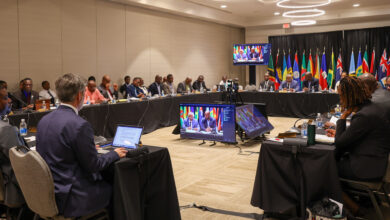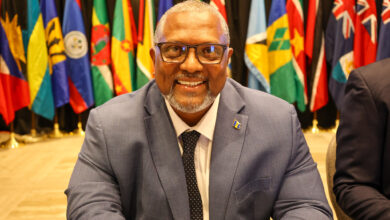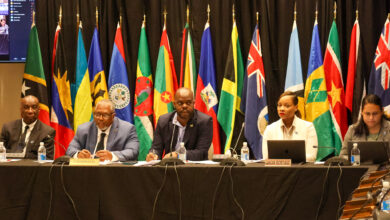(CARICOM Secretariat, Turkeyen, Greater Georgetown, Guyana) Let me start by officially welcoming Ambassador Irwin LaRocque to his first meeting of the COTED in his capacity as Secretary-General of the Caribbean Community. We are all aware of Ambassador LaRocque’s long-standing relationship with the COTED, first as the representative of Dominica and later as the Assistant Secretary-General for Trade and Economic Integration in the CARICOM Secretariat. Ambassador LaRocque, I am sure that I speak on behalf of my Ministerial colleagues, when I say that we expect to be able to take full advantage of your experience with the COTED, and look forward to receiving your expert guidance and assistance in facilitating the work of this Council.
Colleagues, the developments in Europe and with the Euro no doubt have been preoccupying us of late. These developments certainly bring home the vulnerability of our small economies and reinforce the need for the Region to continue its efforts to create a Single Market and Economy if we are to weather the economic storms that we will definitely experience.
As part of our efforts to expand production and enhance competitiveness, we need to pay more attention to increasing intra-regional trade. This requires that we put in place the necessary elements to create a favourable environment to increase such trade. Key elements of such and enabling environment include the harmonization of legislation and procedures relating to rights of establishment, sanitary and phyto-sanitary measures, availability of affordable transportation, regional standards, and of major importance the improvement of the productivity of our enterprises.
We also need to pay critical attention to our engagement with Third States. For our individual Member States to benefit from the relationship with our trading partners there is need for greater attention to be paid to exploiting the opportunities provided by the trade agreements the region has concluded, and also to be able to take advantage of the preferential arrangements accorded to us under those agreements. In this regard we look forward to the conclusion of the ongoing negotiations with Canada.
Our relationship with development partners is also very important. More dialogue is required at the policy level. The focus of our interaction with those partners should not be the mere allocation of resources but instead should focus on how the Region can be supported in its efforts to build a Community for All.
Of course as the Council for Trade and Economic Development, we recognize that the support and participation of the private sector is integral to our work. We must seek to regularize our interaction with the private sector. I recall the proposal from one of my colleagues, for the COTED to institute a mechanism for regular interaction with the private sector in order discuss matters of mutual interest in a constructive manner. I urge us to give due consideration to this proposal.
Colleagues, our mandate in this Council is to do exactly as our name implies, promote the trade and economic development of the Community. In doing so however, we must be careful not to focus only on trade and economics in its strictest sense. I say this to underscore the point that measures to promote the economic development of the Community must take into consideration the human and social aspects. As important as providing affordable access to goods and services is to our people, issues such as climate change, youth empowerment, and the effects of non-communicable diseases on our respective populations is equally important. These issues are not off limits to the COTED but rather integral to our work.
Colleagues, I believe the time for stocktaking has arrived. We are at a point where we are still grappling with the effects of the economic and financial crisis with the daunting prospect of another one on the way. We are at a point where our people are crying out for relief from the high cost of food. Do we as the COTED continue as we have been doing? Or is it a good time to re-evaluate our strategic direction? It is my view that this is a very opportune time for the COTED to review its performance, including its method of work since its beginning, and to strategize on its direction for the next few years taking into account the current global economic reality. I therefore propose that we seek to complete the agenda which has been set before us in quick time in order to have a frank discussion among ourselves on how we as the COTED see our role in the future development of the Community.
Finally, colleagues, in my briefings to prepare to take up the Chairmanship of this Council, I have been made aware of the discussions by our Officials centering on sanctions or more precisely the lack of sanctions in our arrangement. While I believe it is by no means the proposal or desire for the Community to impose sanctions on any of its Member States for failing to comply on any issue, we must consider the fact that in many instances it is the sole responsibility of a Member State to implement an undertaking to which that Member State has committed itself. In certain instances, there are serious implications for the Community arrangement especially when some states have implemented what they are required to do and others have not. I am cognizant of the fact that many of our Member States have implementation challenges owing primarily to a lack of capacity. We therefore need to consider how as a Community we can assist each other in meeting our obligations.
Colleagues, I urge us to consider these issues as we meet to continue the promotion of the trade and economic development of the Community.
I also want to take the opportunity to thank officials for what I understand was a rigorous exercise to make our work as Ministers that much easier.
I thank you.

